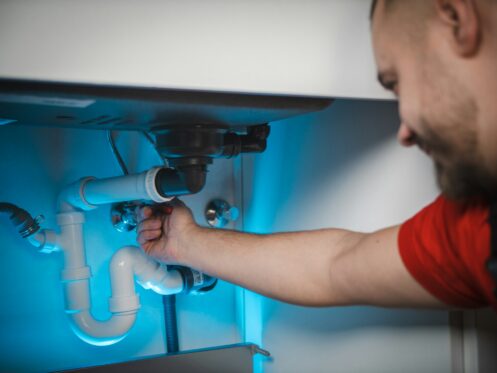Clogged drains can disrupt your day, whether it’s a slow-draining sink or an overflowing toilet. In Palm Beach, homeowners often face plumbing clogs due to various factors, from bathroom mishaps to outdoor debris. Understanding these causes is key to maintaining a smoothly running home.
Preventing clogs ensures your plumbing system remains functional. This involves adopting simple practices like using drain covers and avoiding disposing of certain items down the drain. These steps help prolong the life of your pipes and keep your home comfortable.
Taking action when a clog occurs doesn’t have to be daunting. Many solutions exist, from natural DIY methods to using common plumbing tools. Knowing the difference between a minor blockage and a serious issue helps you decide when it’s time to handle it yourself or seek professional assistance. With these tips, you can tackle any clog and keep your plumbing system efficient.
Understanding Common Causes of Clogs
Identifying Kitchen and Bathroom Culprits
In Palm Beach homes, clogs in the kitchen and bathroom are common due to specific items and behaviors. In the kitchen, grease tops the list of culprits. When fats and oils are poured down the sink, they cool and solidify, eventually blocking the pipes. Food scraps, coffee grounds, and starchy substances like rice and pasta also contribute to clogs when washed down the drain.
In the bathroom, hair is a primary cause of clogs. It tends to clump together, sticking to soap residue and forming blockages in shower drains. Toilet clogs often result from flushing inappropriate items such as wipes, cotton balls, or too much toilet paper. Being aware of these causes helps in making smarter choices to prevent future clogs.
Examining Outdoor Drain Blockages
Outdoor drains can also suffer from blockages, particularly during the rainy season in Palm Beach. Leaves, twigs, and other organic debris can accumulate in gutters and downspouts, obstructing the flow of water. This debris buildup can lead to water pooling and eventually seeping into your home, causing damage.
Roots from nearby trees and shrubs may invade underground pipes, especially if they detect the moisture from small leaks. This root intrusion worsens over time, potentially leading to severe blockages. Regular yard maintenance and inspections can help keep external drains clear and prevent more serious plumbing issues.
Effective Prevention Techniques
Implementing Daily Best Practices
Preventing clogs begins with adopting simple daily habits. In the kitchen, avoid pouring greasy substances, like bacon fat, down the drain. Instead, let them cool and solidify, then dispose of them in the trash. Use a sink strainer to catch food particles before they go down the drain.
For the bathroom, consider installing a hair catcher in your shower drain to prevent hair from accumulating. Also, avoid flushing anything other than toilet paper and human waste. Educating family members about what can and can’t be flushed or washed down drains is vital for maintaining clear pipes.
Using Drain Covers and Strainers
Utilizing drain covers and strainers provides an effective barrier against potential clog-causing debris. In sinks and showers, strainers trap food particles and hair before they have a chance to create blockages. Regularly cleaning these strainers ensures the debris doesn’t accumulate and flow into the plumbing system.
In outdoor areas, consider installing gutter guards to prevent leaves and twigs from entering downspouts and clogging drainage systems. These preventive measures reduce the frequency of clogs and the need for more intensive plumbing interventions, making them essential components of any clog-prevention strategy.
Safe Methods for Clearing Clogs
DIY Techniques with Natural Solutions
When you notice a minor clog, simple DIY techniques can often solve the problem without harsh chemicals. A mixture of baking soda and vinegar is a common natural remedy. Start by pouring a cup of baking soda down the drain, followed by a cup of vinegar. Let it fizz for about 15 minutes, then flush it with hot water. This natural reaction helps break up small clogs without damaging your pipes.
Another method involves using a bent wire hanger. Unbend the hanger so it’s relatively straight, but leave a hook on one end. Carefully insert the hook into the drain and try to pull out any debris like hair or food particles that may be causing the blockage. These straightforward methods can fix minor clogs and keep your plumbing clear.
When to Use Traditional Tools
For tougher clogs, simple tools like plungers and plumbing snakes can be effective. A plunger works well for toilets and sinks. Ensure there’s enough water to cover the rubber part, then vigorously plunge up and down to create suction and dislodge the obstruction.
A plumbing snake, or auger, is more effective for deeper clogs. Insert the snake into the drain and twist the handle, pushing it through the pipe to break up or retrieve the clog. These tools provide a mechanical advantage when natural remedies aren’t enough, tackling clogs that are slightly more stubborn.
Knowing When to Seek Professional Help
Recognizing Persistent or Severe Problems
Sometimes, a clog persists despite your best efforts. If you’ve tried multiple methods without success, or if your drains frequently clog, it might indicate a deeper issue. Pipe damage, tree roots, or serious blockages within the sewer lines require professional attention.
Another sign that you need an expert’s help is if you notice foul odors emanating from your drains, or if water backs up in unexpected places, like a bathtub when you flush the toilet. When these signs arise, it’s best to seek professional evaluation to prevent further damage.
Advantages of Expert Intervention
Calling a professional provides peace of mind, ensuring the job is done right. Experienced plumbers diagnose and rectify complex issues with specialized tools and expertise that go beyond what DIY solutions offer. They can clean or repair damaged pipes, address root intrusion, and perform thorough inspections of plumbing systems.
Professionals also provide valuable advice on maintaining your system and preventing future clogs. Their work guarantees a properly functioning plumbing system, preventing more serious, costly issues down the road.
Conclusion
Maintaining clear drains in Palm Beach requires understanding clog causes and implementing preventive measures. Simple practices like using drain covers and opting for natural cleaning solutions efficiently manage minor blockages. However, persistent or severe clogs necessitate professional intervention to ensure long-term solutions.
For Palm Beach homeowners, knowing when to call in the experts can save time, money, and stress. By combining preventive steps with timely professional help, your plumbing system can run smoothly, offering you comfort and peace of mind. If you encounter complex sewer issues or periodic disruptions, don’t hesitate to seek professional services.
Encountering plumbing issues in your Palm Beach home? Legacy Plumbing Experts is here to help! From managing simple clogs to solving complex plumbing problems, our experienced plumber in West Palm Beach provides reliable and efficient services tailored to your needs. Contact us today to ensure a smoothly operating plumbing system and avoid pesky clogs in your home.

